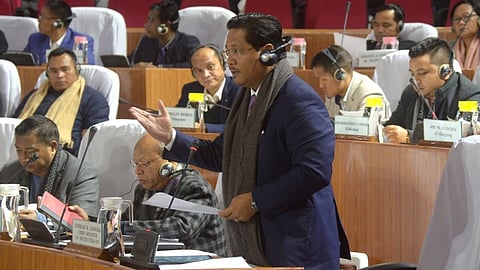
- Home
- Live Blog
- Breaking News
- Top Headlines
- Cities
- NE News
- Sentinel Media
- Sports
- Education
- Jobs

A Correspondent
SHILLONG: The Assembly on Monday ratified the Constitution (One Hundred and Twenty-Sixth Amendment) Bill, 2019, which was passed by the Parliament on December 12, to extend quota to scheduled tribes (STs) and scheduled castes (SCs) in the Lok Sabha and State Assemblies by another 10 years.
The State legislatures need to ratify the Bill before it is placed for assent of the President of India.
The Bill, which amends provisions related to reservation of seats for Scheduled Tribes (STs) and Schedule Castes (SCs), was unanimously adopted by the House during a special session of the State Assembly.
This provision which has been provided for a period of 70 years since the enactment of the Constitution, will expire on January 25 this year. The Bill seeks to extend the reservation for SCs and STs by another 10 years till January 25, 2030.
Prior to the adoption of the resolution, leader of Opposition, Dr Mukul Sangma expressed his concern over the fact that the Bill seeks to extend the reservation for SCs and STs by only 10 years.
“As a House keeping in mind that we belong to vulnerable group voice should emanate as far as period of extension is concerned. Should we again lobby around after the expiry of the extension period or let it lapse,” the leader of opposition said.
Dr Sangma also expressed concern that reservation for Anglo-Indians has been dropped from the current amendment Bill.
Lone Khun Hynniewtrep National Awakening Movement (KHNAM) MLA from North Shillong, Adelbert Nongrum said that political representation alone will not suffice if the government of India does not support and ensure economic and social progress of the SC and ST communities.
Nongrum pointed out to the recent decision of the government of India to grant citizen to persecuted minorities from neighbouring countries under the Citizenship (Amendment) Act (CAA), 2019.
He expressed fear that those acquiring such citizenship settling in the region, particular those from Bangladesh, would alter the demography of the region and severely jeopardise and threaten the political security of the tribals across all the tribal majority states in the region.
The KHNAM legislator said that on the one hand the government of India is ensuring continuous representation of tribal in the legislature through reservation vide the 126th Constitutional Amendment bill, while at the same time undermining the tribal character of states in the region through the CAA.
“I am afraid that once the demography changes happen and the tribal becomes a minority, then the next steps that would follow is for us to lose the political security that we enjoy today,” Nongrum said.
In reply, Chief Minister Conrad Sangma said that every ten years amendment to Article 334 is required.
According to the Chief Minister, under Article 334, reservation originally required to cease by 1960 but since then every decade it has been extended.
“There has been a practice to extend every ten years. This is not something which has happened out of the blue,” Conrad said.
He also pointed out that in the case of the Anglo-Indians – their population has dwindled to only 295.
“Therefore to give them reservation for two Lok Sabha seats and representation in 14 States was too large,” the Chief Minister said.
He said that for this reason it was hard for the government of India to justify reservation for Anglo-Indians.
On the other hand Conrad pointed out that there are 10.43 crore tribals which constitute 8.6 per cent of the country’s population and Scheduled Castes consists 16.6 per cent of the total population.